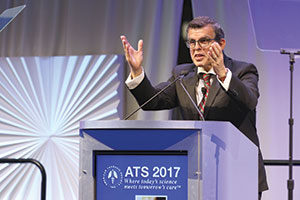
ATS President David Gozal, MD, MBA: ‘A powerful partnership in medical research has emerged involving academic institutions, industry, and government.’
The ATS continues its efforts to impact health care and policies domestically and around the globe. The ATS president and president-elect outlined those efforts in addresses Saturday evening during the ATS 2017 Opening Ceremony.
Proposed changes in U.S. health care and environmental policy are contentious topics on Capitol Hill, and ATS President David Gozal, MD, MBA, made it clear during his address that the ATS does not agree with some of President Donald Trump’s positions.
“Here in the United States, since the end of the second World War, a powerful partnership in medical research has emerged involving academic institutions, industry, and government,” Dr. Gozal says. “Together, we have made truly remarkable progress in many key areas of pulmonary, critical care, and sleep medicine. That partnership is facing significant challenges, some would say a crisis. And that’s why it is so fortunate we are having this conference here in Washington.”
To counter the president’s proposals, the ATS is redoubling its advocacy tactics. It is holding a rally on Capitol Hill and sending members to visit their congressional representatives—both on Tuesday.
“When it comes to public policy advocacy, whether in the United States or internationally, our priorities have not changed—including funding for medical research, access to health care, clean air, and tobacco control,” Dr. Gozal says.
Dr. Gozal also discussed some of the Society’s other priorities, including attracting more early career professionals to pulmonary, critical care, and sleep medicine with targeted programs. The new ATS Emerging Leaders Program was launched during the conference and aims to cultivate a pipeline of leaders who can serve the global community, their own institutions, and the ATS. Other efforts include the Best of ATS Video Lecture Series—a series of peer-reviewed educational videos—and continued support from the ATS Foundation Research Program to fund young researchers.
“So why do we spend so much time and effort cultivating the next generation of researchers and clinicians? Why is advocacy such a high priority?” Dr. Gozal asks. “The answer is really quite simple and straightforward. We do it for our patients. We do it to make their lives better, and in so doing make the world better, too.”
The ATS is expanding its general education efforts. It has added new editors for the American Journal of Respiratory Cell and Molecular Biology and Annals of the American Thoracic Society, and it has started a new clinical guideline implementation program.
“This pilot program will work closely with select hospitals to determine how our guidelines can be best implemented to improve patient care,” Dr. Gozal says. “We also are starting a new Pulmonary Function Testing Laboratory accreditation program to ensure that PFT labs meet the same high standards as other medical labs.”
ATS President-Elect Marc Moss, MD, explained the efforts of the Society to expand its global footprint.
The Global Scholars Program, which seeks to help address the shortage of advanced training programs in respiratory, critical care, and sleep medicine in middle- and low- income countries, offers 25 webinars on a range of topics.
The MECOR 2.0 program offers a hybrid course emphasizing out-of-class preparation that enables a greater focus on individual students in the classroom. Finally, the ATS is co-sponsoring a South American conference from July 13-15 in Sao Paulo, Brazil. It will focus on acute respiratory failure and mechanical ventilation.
“Taken together, these initiatives demonstrate the ATS commitment to broadening our scientific and clinical reach throughout the world,” Dr. Moss says. “In the years to come, you will see ATS investing more resources in these types of activities. They are an essential component in the overall drive to improve lung health globally.”
